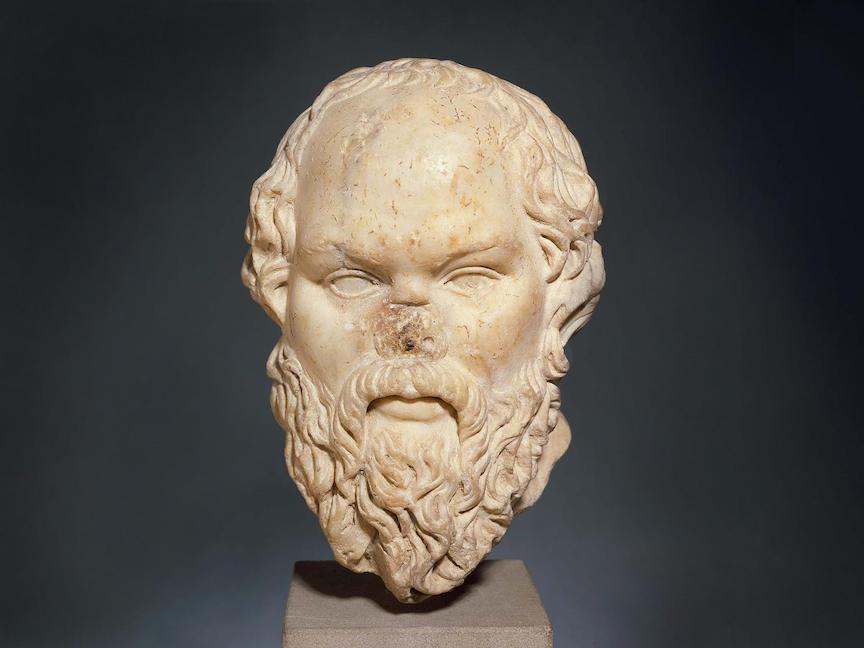Eudaimon: Socrates, Socrates! Wait! I need to talk with you.
Socrates: Well, well. My young friend, owl-eyed Eudaimon. How kind the gods are to let us meet again here, seemingly by chance, under these sheltering trees, as the sun goes down in the mist-filled West. What has you so agitated at this evening hour? Another romantic misadventure?
E: No. The whole city seems aflame with a raging fever, Socrates. All summer, I’ve hoped for the public battles to cool down, as in past years. But they haven’t. The public men are indicting one another everywhere, in the law courts, like madmen. The agora is in constant uproar, even on the hottest days. In summer, the big men used to seek relief from the heat in their shady country houses. This year, wildfires are raging. The lyre-players are singing about the callousness of rich men in the North, and horrors in the city unthinkable in a small town. Even the high priests are caught up in the madness.
S: Slow down, my young Eudaimon. I know several high priests. Some have indeed drunk deep of the general madness. But quite a few understand what’s happening, and are as appalled as you are.
E: But what are they – what are we all – going to do? This simply cannot go on.
S: You’re right, and how blessed you are to have already learned that at your tender age. It’s heartbreaking when a great city like ours, with a brilliant history, seems hellbent on destroying itself.
E: You’re being entirely too philosophical about this. You can’t just take it calmly. We’re near utter breakdown!
S: Too philosophical? I don’t understand what that means. Is not philosophy, as the name indicates, a love of wisdom?
E: Yes.
S: And is it not the first responsibility of wisdom to discover the truth?
E: Yes.
S: And that it’s only knowing the truth that we can act well?
E: Yes, but you’re taking this all too lightly!
S: I assure you, Eudaimon, that I do not take it lightly at all. Our situation is of the gravest concern. But before we act, we must know what wisdom counsels.
E: Yes. Maybe. I don’t know. All I know is that if philosophy can’t fix this – and fast – what good is it?
S: You speak as if we are gods, not mortals. That’s how political men talk, who try to persuade us that they can control everyone and everything for our benefit – not theirs, of course – as a farmer controls a dumb beast.
E: So what alternative is there?
S: Well, first to control ourselves, which is already hard enough. And not to add flame to fire. When the souls of so many fellow citizens are so twisted, it’s a long, hard task to teach them to follow straight ways again. As you well know, I have been teaching all my life. But at times like these, many grow deaf and blind to the counsels of reason. And there’s no help for it, unless some god has mercy, comes down, and intervenes. I pray daily that one will – and so should you.

E: But what else can I do? We have men claiming to be women, and women to be men! Next, they will say men and women may compete against each other in the Panathenaic or the Olympic games, even in the σκάκι! It’s madness!
S: Such obvious insanity shows that, besides evil ideas, evil spirits infest the city. Consult the good priests about that. Often. But meanwhile do everything you can, dear Eudaimon, in every situation to the utmost of your strength, without losing your own self. Remember that the partisan battles in the agora take place mostly over power, rarely over the true or the good, and then only temporarily. There are two battles ever being fought, one a matter of ever-shifting gain and loss, the other for the permanent things. A good man may need to go to prison, even die, for one or both of them. But don’t let your soul become like the souls of those whose whole lives are consumed seeking power.
E: Yes. . . .I see that. And I suppose that also applies to other things. The older doctors used to swear not to kill children in the womb. But the newer doctors and the politicians say it’s a sacred right. What’s changed, Socrates?
S: Nothing. It’s one of the very greatest evils when we allow those who have power to kill others, weak innocents, for their own benefit. It profanes that very sacredness of life that makes the good city possible. Such blindness is a punishment from the gods, who are not vindictive, but punish only to warn us.
E: Is all, then, lost Socrates?
S: That’s not for us to know. You want public success – to save all that’s good in our beloved city. I do, too. And labor for it all I can. But cities, empires, whole civilizations have destroyed themselves many times in the past. And will again. So, honor the gods, your family, your city by living in the way that everyone should: civil to all, slow to anger, forgiving of minor faults and even some larger ones, but unflagging in seeking the good. Study the difference between good and evil, and hold to it as your very life. Speak and act, always, in terms of good and evil – even when the situation makes it difficult. Especially then.
This is the high honor of being a human being, my dear Eudaimon, to bear one’s soul in truth, nobly, in the midst of much that is false. And ignoble. If you seek what to do, do this. It will make you a naturalized citizen of another city, even in the midst of the many struggles here, a city that cannot fail – or ever be taken from you.
__________















